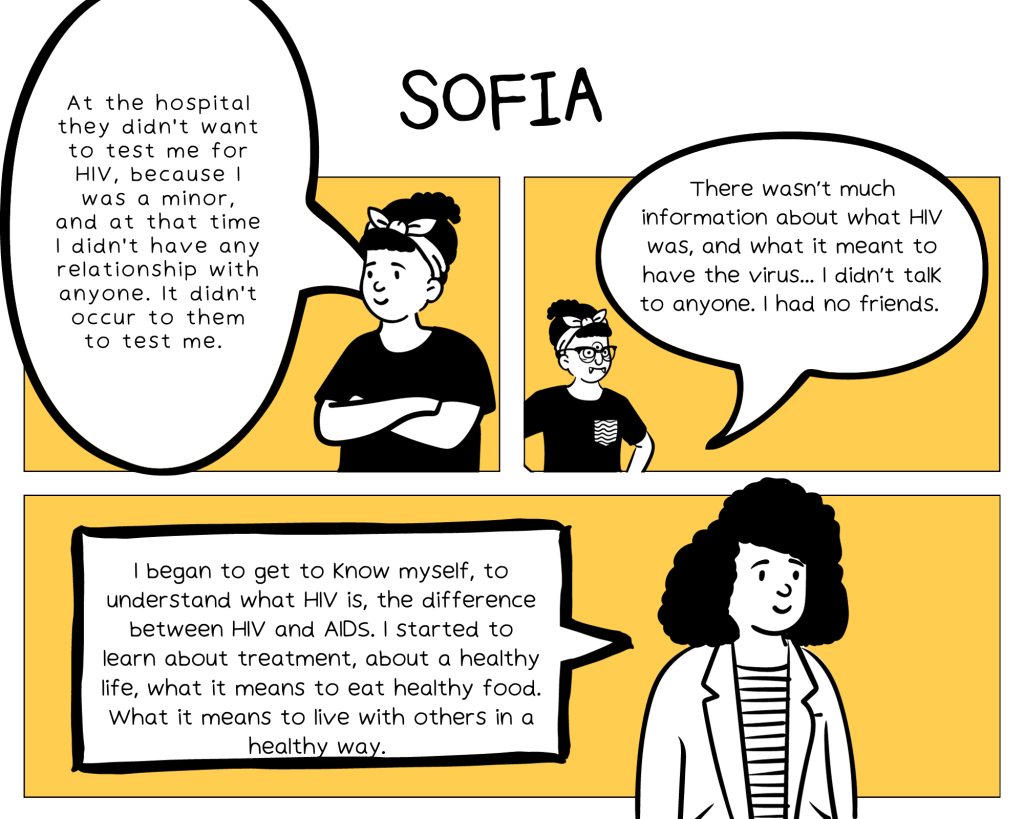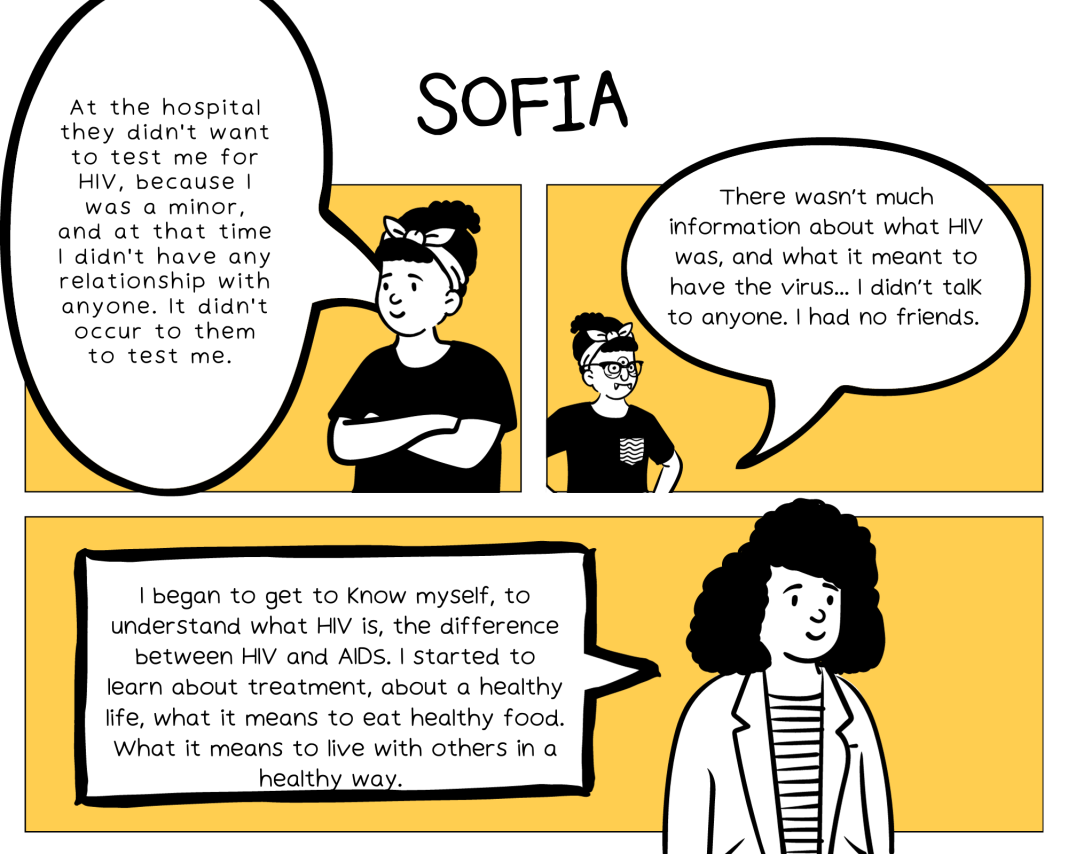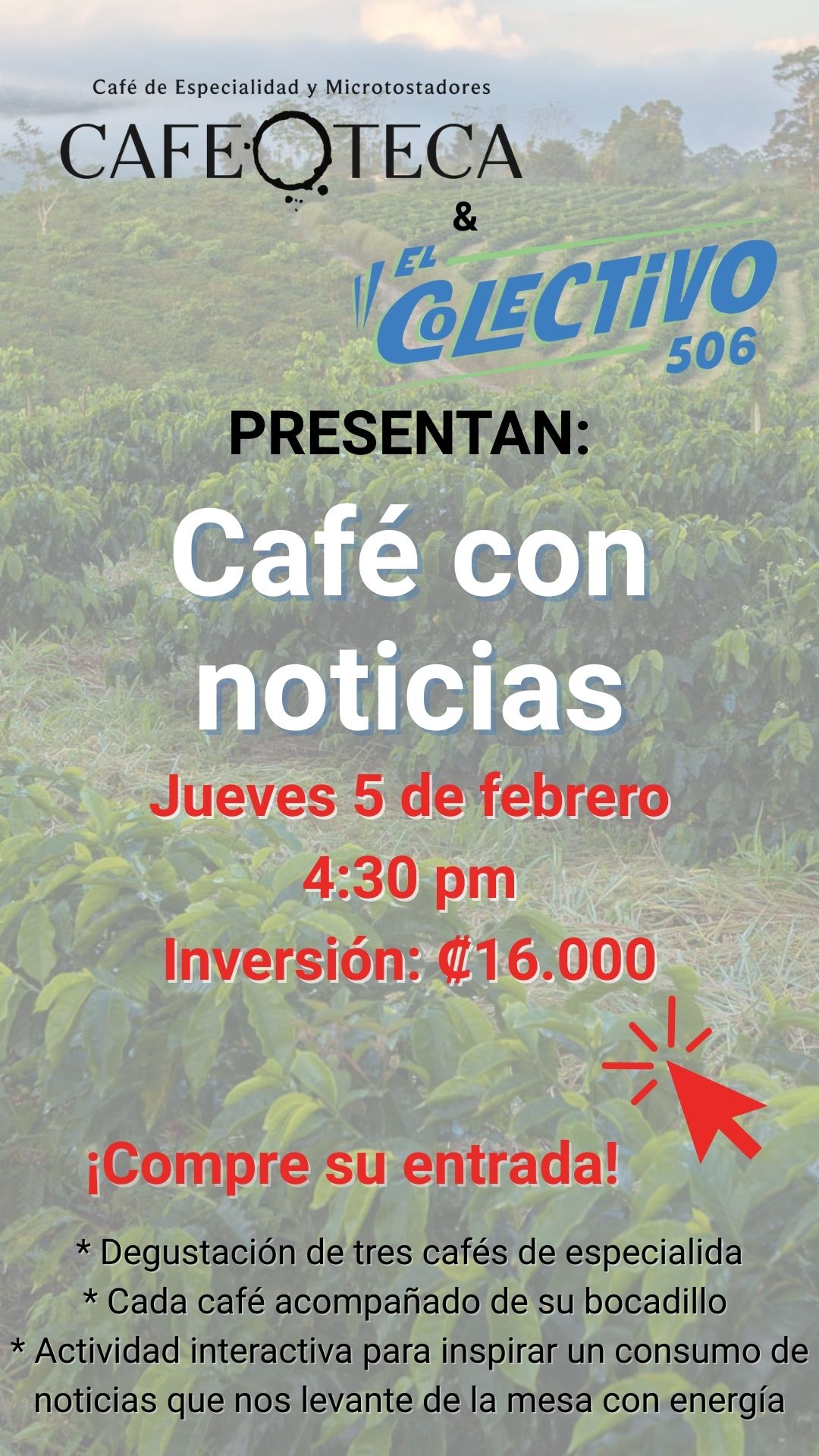Sofia* is 27 years old. Human immunodeficiency virus (HIV) was transmitted to her when she was born, in Nicaragua. However, she says that her family never knew that HIV-AIDS had led to her mother’s death, so Sofía was not diagnosed until she was a teenager in Costa Rica. Her two younger siblings do not have the virus.
At the time of our interview in July 2023, Sofía lived at the Nuestra Señora de la Esperanza HIV Home in Cartago. She started telling her story with a bit of reluctance and fear, but this grew into a very frank expression of the difficulties and anger she has experienced since her diagnosis. (Read more in “Sofía comes out of her shell,” part of our four-part series on this topic.)
Excerpts follow, edited for clarity and brevity. Her name and certain details have been changed to respect her privacy, at her request and in consideration of the discrimination that people with HIV continue to face.
I was diagnosed with HIV when I was a minor. I was born with the condition, but we didn’t know, since my mother had passed away and we were all very little. My siblings and I grew up with different families; I grew up with a relative here in San José.
When I was 14 or 15, I started to feel unwell. It really went on for two years, but I was always a very private person—to this day, I’m still a little like that, but I’m working on it—so there were a lot of things that were happening to me, but I never let my relatives know. I had severe diarrhea for a year and they didn’t know. Once, when I spent almost the entire night in the bathroom, without sleeping at all, a relative came and said, “You spent almost the entire night in the bathroom, right?” I told him, “Eh, no, it was nothing.” I lied. But that diarrhea was killing me.
I went to school as usual, and that day when I came back, I had only the strength to get to the entrance of the house. I don’t remember anything more after that point. I fainted, and they took me to Calderón Guardia Hospital. I was 15 years old.
When I was able to open my eyes, they began to do tests on me. All the tests they did on me… the results weren’t so good. My potassium was at zero. Almost everything was at zero. They said, “This girl is living by the grace of God. We don’t know how. It’s clear she has a problem, but we don’t know what it is.”
At the hospital they didn’t want to test me for HIV, because I was a minor, and at that time I didn’t have any relationship with anyone. It didn’t occur to them to test me. [Eventually a doctor] ordered an HIV test for me, but… they rejected it. They sent me home with IVs.
Two weeks went by, and I was getting worse. They had to send me again [to the hospital]. They did the same tests, and nothing. I went to the same [doctor] again; he ordered the [HIV] test again, and again they rejected the test, because if I didn’t have a history or a family member who had it, and at that time I didn’t have a partner or anything, it wasn’t logical to take an HIV test. They sent me home again with serum, but by then I was already very weak.
My family members were worried. They didn’t know what to do. They knew that at some point, I could die. I got worse that third time, and they had to keep me in the hospital for more than a month. [For the third time, the same doctor asked Sofia to be tested for HIV; for the third time, the request was rejected.]
My family members saw that I was getting worse. They used their savings to take me to a private clinic in Desamparados. They did all the tests on me again, but this time, they also did an HIV test… That doctor was the one who told us that I had HIV.
At 15, I was forced to grow up fast. In a way, I didn’t enjoy my youth because I had this diagnosis and I thought I was going to die at any time. I stopped enjoying life. I was just waiting for my time to come.
There wasn’t much information about what HIV was, and what it meant to have the virus. I didn’t put that much thought into it. After that, I didn’t talk to anyone. I had no friends. I stayed in my world, in a box, basically. I pulled away from the outer world and even from my family.
To a certain degree, my family didn’t educate themselves, either. Even to this day they need to do a bit more. They gave me a separate plate, everything separate… They acted as if they weren’t afraid, but they were. One thing is what you say and another is what you do. You suffer discrimination from your own family.
The loneliness was eating me up inside, the lack of information. My emotional state was at rock bottom. Everything was fine with me [in terms of my viral load]: it was undetectable. It even got to the point where I got tired of taking medication. I wanted to stop because I was tired of taking this cocktail, which is different from the one I take now, which is just a pill.
So I gave up more than four times. When I went in and my test results were bad, the doctor asked me, “Are you sure you’re taking medication?” “Yes, everything is fine”… The [psychologist at the Calderón Guardia Hospital] started trying to get information from me, and he never could, because I never opened up to anyone.
I’m very into keeping things to myself. I like my privacy. But you have to know how much privacy you can have, or how much silence—because sometimes, remaining silent really affects us.
In 2020 or 2021, they changed my doctor because no one could handle me anymore… because I always lied to them. I and gone through four doctors, maybe even five… with this [new one] I did open up and say, “Doctor, I just got tired of taking the medications.” He said, “But you know you’re not going to die all at once. So many things can happen to you before you die. First you can get a fungus. After that, you can develop other problems. You might even end up in a wheelchair. Or maybe you will no longer be able to eat normally. They have to make a hole in you to introduce your medications and food. Do you really want that?”
[The doctor managed to put Sofía on a list for a new medication that replaced the “cocktail” of several, but even so, she abandoned the treatment again. Her CD4 level began to drop again. She kept lying to his medical team, but one day, one of her nurses organized a group meeting—an intervention of sorts.]
She took me to the office. Then my doctor arrived. Then the psychologist arrived, and the other nurse arrived, and they started talking to me. They told me, “Sofía, we know perfectly well that you are not taking your medication.”
That’s when I let it all out. I started crying—something that I had never [done], that I have always kept inside. I felt like I had no right to cry. I had no right to many things. I had no right to be alive.
Then I began to open up to them. I told them that I was experiencing a family situation that wasn’t great. They asked me, “If we gave you the opportunity to live somewhere else, at a home, would you leave?” Without thinking about it, I said: “Yes.”
First, I told my cousi. Then my cousin went with me to tell my aunt. She didn’t take it well. Why am I leaving? Did they not treat me well? This and that. “What did you say to those people?” she asked me. I explained, “But it’s for my mental health. To reeducate myself about what the treatment is all about.”
She took me [to the hospital] the next day, and when I arrived, everyone was waiting for me. The staff told me, “We were waiting to see if you would show up or not, because many people have said ‘yes’ to us, and then they don’t come.” I had my suitcase and everything ready—but then I began to question myself. When I arrived here, I was welcomed very warmly. But I sat on the bed and said to myself, “What did I get myself into? This is no longer a joke. This is for real. This is not a game.”
So I got started. I began to get to know myself, to understand what HIV is, the difference between HIV and AIDS. I started to learn about treatment, about a healthy life, what it means to eat healthy food. What it means to live with others in a healthy way. As one doctor told us, the more you know your enemy, the more you know where to attack him and how to protect yourself.
I used to stay quiet. It was difficult for me to hold on, and it was difficult for me to let go. But later, going to certain therapies with the psychology and social work teams, I began to let go, to tell my story a little more and to open up a little more.
I never in my life thought I’d say that I’m grateful to be HIV positive. But for me, it has opened lots of doors that, if I were a normal person—well, what I think is normal—I wouldn’t have the possibilities or the comfort that I have here. It’s all about self-empowerment and knowing yourself, because mental health is so influential.
[When I think about what I would like to change for people with HIV]… I would have liked more understanding. Just like all my [fellow residents], I would have liked more information, starting at home. And in schools, so that later, when one is at work or sharing with someone, it is not news that alarms others and [affects] our mental health.
How is it possible that in certain health clinics, or at an Ebais (community health team), they don’t grasp what HIV is? Even at a dentist that is close to an EBAIS, I once went to have my teeth checked. I told them that I had HIV. They stood there looking at me with these fearful faces. He and his assistant put on, like, three gowns, triple gloves, and another covering. I was like, ‘You’re just going to check my teeth. I’m not an alien. You’re not going to experiment on me.
I suffered many, many things in different health service facilities. Once I went for validation—since I’m a foreigner, I didn’t have my papers, and I had to validate my rights all the time, often with different people involved. One day, I had to deal with this woman who must have gotten out of bed on the wrong side. I said, ‘I have HIV, and they sent me here to get a stamp so the doctor can treat me’. She made this face. I was thinking, ‘Here we go again,’ because this wasn’t the first time… There’s this pen that they usually have out there, but [she wouldn’t let me use it]. And when she gave me the seal and everything, she handed me the paper like this.” [Shows how it was delivered gingerly, removing the hand quickly to avoid any physical contact.] It surprises me that there are many in Calderón Guardia himself, or who are working in a health area [who are uninformed].
How can they not be informed? And what do they confuse HIV and AIDS? IThe [term] AIDS should no longer be used. It’s like saying an advanced stage—like cancer, which has its advanced stage. HIV is the same, and HIV is no longer a disease that people need to be alarmed about. It is a chronic disease like diabetes. We can live a normal life, but without losing our grip on reality.
*Sofía’s real name has been omitted at her request, to protect her privacy and in consideration of the discrimination faced by people with HIV in Costa Rica. Learn more about HIV Hogar Nuestra Señora de la Esperanza at their Facebook page, contact by email, or donate via SINPE Móvil at 8507-7676.







